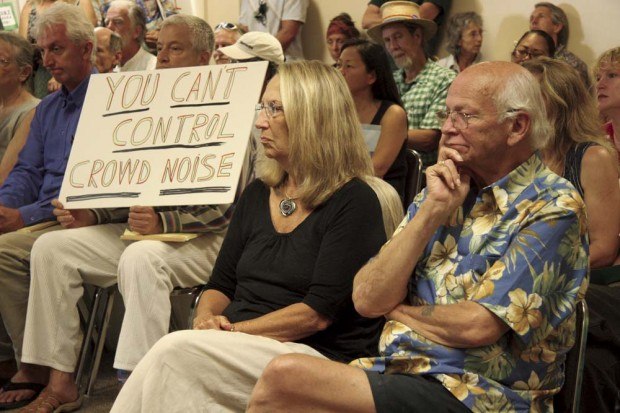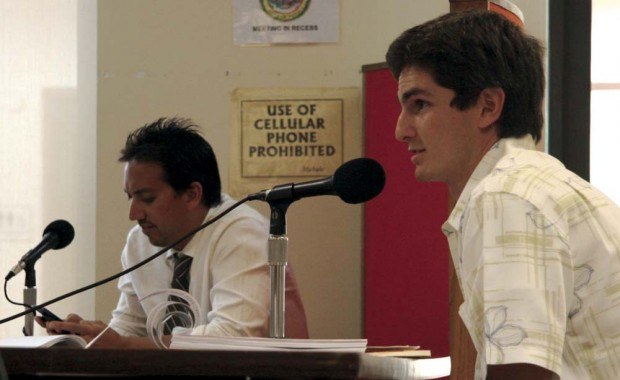LIHU‘E — The county Planning Commission on Tuesday unanimously approved the necessary permits for Anaina Hou to proceed with the next phase of an increasingly controversial project in Kilauea.
Phase II involves the construction of an amphitheater, movie theater, commercial kitchen and conference room. Phase I of the project — a miniature golf course and park-and-ride facility — has been operating since December.
“The decision is up to you, and I hope you go our way,” project financier Bill Porter told the commission, drawing an ovation lasting half a minute from many in attendance.
Many key players in the community joined the crowd of roughly 80 residents, cramming into the commission’s meeting room at the Mo‘ikeha building in Lihu‘e.
Porter said the project is about “giving back” to the community, but the approval process was a bumpy road.
Anaina Hou, which means “the gathering place,” was intended to bring the North Shore community together, but ended up creating division, especially within the Kalihiwai Ridge neighborhood.
A little over two-thirds of the approximately 60 speakers swayed to Porter’s side. The opposition cited potential zoning violations, but the real issue was noise pollution from the amphitheater.
“You cannot control people having a good time,” said Kalihiwai Ridge resident Mark Goodman, drawing laughter from the audience.
Koohan Paik, author of “The Superferry Chronicles” and a Kalihiwai Ridge resident, said she may be outnumbered — a project supporter called the opposition the “rabid minority” — but sometimes laws are in place to protect minorities.
“I’m sick and tired of paid promoters telling us the community wants this development,” she said. “I’m also very upset, like so many people are, about the divisiveness that this has caused in our community.”
The land is zoned open space by the county and agriculture by the state. Goodman said the county planning director’s report comparing the amphitheater with a religious facility — a permitted special use on open space property — would “really set a precedence.”
Kilauea resident Felicia Cowden said she lives in a tight neighborhood, which has several community events going on, such as farmers markets, park gatherings and church activities.
“Let me tell you, those churches rock,” she said. “They’ve got really good bands. I hear them.”
Cowden said that the willingness to tolerate noise from such gatherings is what makes the community a community.
“When I sit here hearing about people with those beautiful homes and lots of acreage … it sounds like the haves are needing to have more,” she said. “I have zero sympathy over the sound issue for these people.”
Those who spoke in support of the project included Malama Kaua‘i President Chris Jabe, Malama Kaua‘i Executive Director Keone Kealoha, kumu hula Kehaulani Kekua, former Kalihiwai Ridge Community Association treasurer Gary Pierce, Kaua‘i Community College agriculture program coordinator Paul Massey, and Moloa‘a farmers Tim and Hope Kallai, among others.
Those who opposed the project included Paik, community activist Brad Parsons, ousted KRCA Board President James Gair, Bettejo Dux, lei-maker Marge Dente, and former County Council candidate Ken Taylor, among others.
Without taking sides, developer Michelle Hughes — who lives about a mile away from the project — praised the work and intention of the Porters, but said there needs to be balance, sensitivity, respect for the law and a final analysis on impact mitigation.
Many speakers spoke on behalf of the Porters’ philanthropic nature and willingness to “give back” to the community. Porter himself said the project is a “real loser” from a commercial point of view. But some were still not persuaded.
“I don’t believe there’s such a thing as a benevolent capitalist,” said Puhi resident Raymond Catania, causing laughter from both sides of the issue.
Permits granted,
with amendments
The KRCA board in June filed a contested case against Anaina Hou. The board was ousted by association members who felt they weren’t being represented. A new board on Feb. 15 dropped the contested case and co-signed a settlement with a set of 19 conditions.
After listening to hours of public testimony, Commissioner Caven Raco still was unsatisfied with an agreement to keep noise at 55 decibels at the property lines; he wanted to have concrete answers about finding a solution if the issue came up.
“Sound is what is dividing this community, which is unfortunate,” Raco told project manager Michael Kaplan. “You as the key-holder need to find a win-win situation. So I’m asking you, what can you propose or come up with to make it a win-win situation?”
Kaplan said he would like to reach an agreement, and would be happy to work with the neighbors and commissioners to determine frequency numbers.
Anaina Hou’s Karen Tang stepped in and said that maybe they could commit to operate only a certain number of nights.
Raco said it was Anaina Hou’s responsibility to tell the commission what their scenario would be.
“You need to come up with a proposal,” Raco said.
Kaplan asked for a recess, and after a consulting with Porter, Kaplan proposed to operate the amphitheater only Thursdays through Saturdays and on holidays until 10 p.m., plus Sunday until 6 p.m.
The facility will still have to keep the noise level at its property lines under 55 decibels. Kaplan told Raco he would resolve the noise issue if the noise exceeds the agreed-upon levels.
The commission approved the project after the word “resolve” was included in the noise mitigation condition and Kaplan’s proposal was amended to the settlement.
Besides days of operation and noise control, the conditions also deal with dust reduction, traffic management, water issues, hours of operation, emergency procedures, event scheduling and permits.
Kaplan said afterward that he came to the meeting feeling confident the decision would go Anaina Hou’s way.
“With conditions in place there shouldn’t be any adverse impacts to the neighborhood,” he said.
If the project goes smooth, it should take about a year until construction commences, Kaplan said.
“We still have to get building permits,” he said, adding that he still has to evaluate noise mitigation measures and finish the design.
However, developers and supporters of Anaina Hou may not have seen the end of the fight.
“We’re going to appeal this until the right decision is made,” Parsons said during a break in the almost eight-hour-long meeting.
Parsons said the supporters may outweigh the opposition, but the process was not a “popularity contest.”
He said the case would be appealed at the Hawai‘i Supreme Court.
Visit www.kauai.gov for more information and www.thegardenisland.com for past articles about the issue.
• Léo Azambuja, staff writer, can be reached at 245-3681 (ext. 252) or lazambuja@thegarden
island.com.






